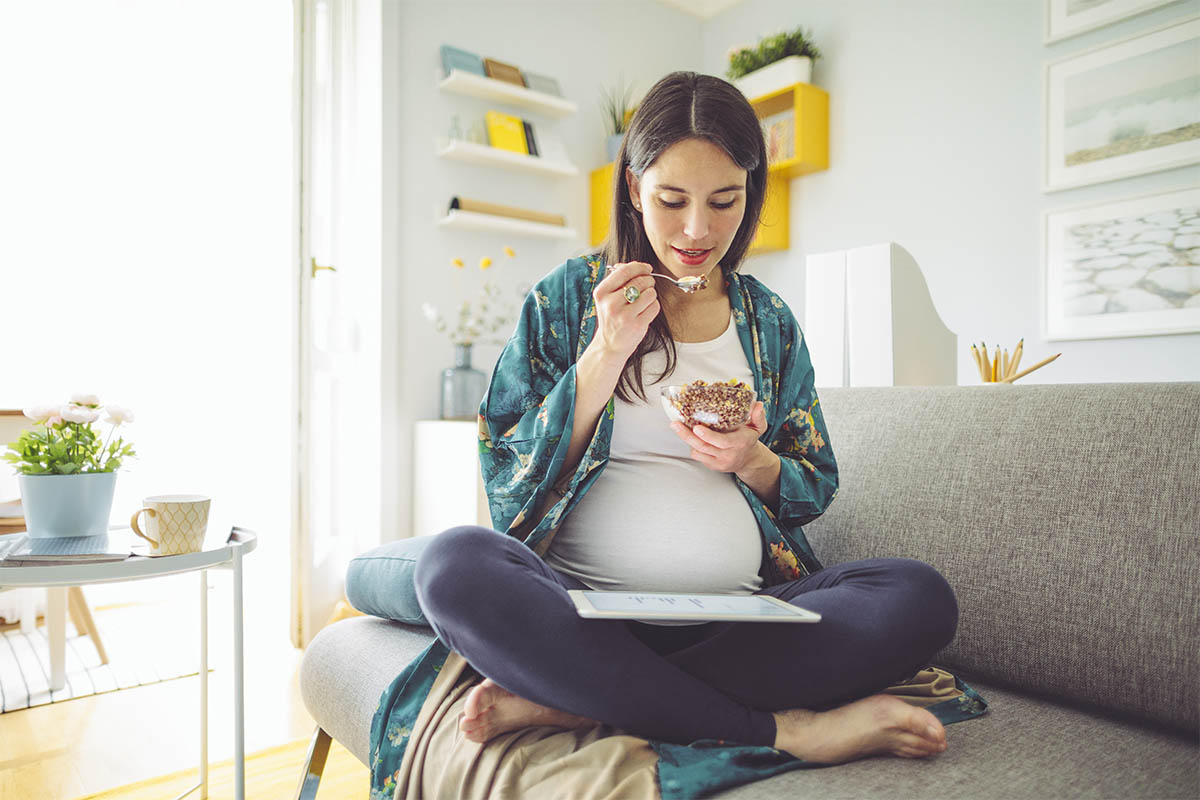
Last updated:
Pregnancy places additional demands on how a woman nourishes her body. We've all heard stories about cravings, morning sickness and what to eat while pregnant. Are the stories true or are they urban myth? We chat to Loren Muhlmann, an Accredited Practising- Dietitian, to get her advice on nutrition during pregnancy.
What causes cravings during pregnancy?
There isn't a lot of conclusive evidence about why cravings occur, but Muhlmann says one theory relates to nutritional deficiencies.
"If the food is relatively healthy and as long as it's safe for pregnant women to eat, I don't see a need to resist that craving,” she says.
Muhlmann says cravings are unlikely to last the entire pregnancy. In her experience cravings disappear at around 16 weeks for most women.
Is morning sickness related to what you eat?
Nausea during pregnancy occurs in about three-quarters of women and can appear at any time of the day. Nutrition may play a role and Muhlmann says there are nutritional remedies that can help relieve the feelings of nausea.
Eating smaller meals and increasing meal frequency can help to manage nausea. If experiencing nausea Muhlmann suggests eating six smaller meals a day.
"Avoid skipping meals because that can make nausea worse,” Muhlmann says.
"Try not to overfill the stomach and limit large quantities of fluids while eating.”
Another way to manage morning sickness is to keep plain, high-carbohydrate foods next to your bedside. Nibbling on crackers, cereal, or toast before getting out of bed.
What should you eat when pregnant?
Most pregnant women need roughly 200 extra calories a day, which busts the “eat for two” myth. Focus on nutrient-dense rather than energy-dense foods. Muhlmann says expectant mothers should ensure they are getting adequate amounts of vitamins and minerals, especially iron, vitamin C, vitamin B, folate, zinc and iodine. She encourages a simple approach to meal planning.
It's important to get a variety of foods from all of the five food groups, including vegetables, fruits, meat and alternative proteins, dairy, and whole grains.”
Muhlmann recommends using the plate method from the Australian Dietary Guidelines to Healthy eating during your pregnancy.
What foods should you avoid during pregnancy?
Listeria infection and salmonellosis are two foodborne illnesses that pose a risk during pregnancy. Her advice for pregnant women is to eat only freshly prepared foods, refrigerate leftovers promptly, and don't eat anything more than a day old. Make sure to thoroughly reheat any leftovers to steaming hot and don't eat anything past its “best before” date.
"It's important to wash all fruit and vegetables,” Muhlmann says.
"Avoid ready-to-eat foods from salad or sandwich bars, smorgasbords or buffets.
Foods like meat, chicken, fish, and eggs must be cooked thoroughly. Do not eat raw, undercooked or smoked meat, including sushi, and no runny poached eggs.
Avoid ready-to-eat, sliced cold meat, soft cheeses like Brie or Camembert, and blue cheese, unless these foods are thoroughly cooked as part of a dish like pasta or in a casserole.
Also at risk for listeria is soft-serve ice cream and frozen yogurt, unpasteurized dairy products and any type of sprout.”
Lastly, Muhlmann recommends limiting caffeine to 200 milligrams per day and advises there is no safe level of alcohol while pregnant. Ideally, pregnant women should stay hydrated by drinking 8-10 glasses of water a day.
Is it safe to eat fish while pregnant?
Cooked fish is considered a healthy choice for pregnant women. It's rich in protein, minerals and a great source of Omega 3 fatty acids. There is, however, a concern about mercury content in fish. In Australia, mercury levels are lower so it's safe to eat fish in moderation.
“Fish is really healthy for women to eat during pregnancy,” Muhlmann says.
“Pregnant women can have two to three 150 gram servings per week of fish.”
However, they should be selective with the type of fish they eat. Fish with high mercury levels include shark, ray, swordfish, barramundi, gemfish, orange roughy, ling, and southern bluefin tuna.
Is there a good website to find recipes?
Muhlmann recommends several resources for delicious, free recipes for any woman to use while pregnant.
Eat for Health
LiveLighter
Pregnancy recipes at Taste
Diabetes
Australia
Disclaimer:
This article contains general information only and does not take into account the health, personal situation or
needs of any person. In conjunction with your GP or treating health care professional, please consider whether
the information is suitable for you and your personal circumstances.